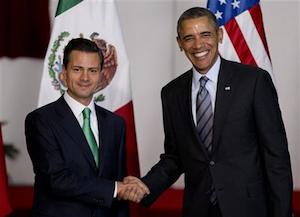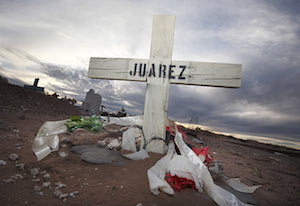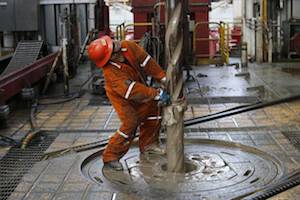 Earlier this week on Wednesday, the NAFTA summit was held in Toluca, Mexico where President Obama, Canadian Prime Minister Stephen Harper, and Mexican President Enrique Peña Nieto met to discuss a wide array of economic and political issues. Saving the monarch butterfly, the Keystone XL pipeline, immigration reform, and the Trans-Pacific Partnership were a few of the major issues in focus during the summit. A key area that was not addressed as adequately as Mexican President Pena Nieto would have liked was energy.
Earlier this week on Wednesday, the NAFTA summit was held in Toluca, Mexico where President Obama, Canadian Prime Minister Stephen Harper, and Mexican President Enrique Peña Nieto met to discuss a wide array of economic and political issues. Saving the monarch butterfly, the Keystone XL pipeline, immigration reform, and the Trans-Pacific Partnership were a few of the major issues in focus during the summit. A key area that was not addressed as adequately as Mexican President Pena Nieto would have liked was energy.
Last year was historic for Mexico, as many reforms were pushed through congress, including an energy reform which will open up the oil & gas industry for private investment through licenses and profit-sharing, and will allow private companies to generate and supply electricity (World Economic Forum). The historic reforms could truly open the doors of Mexico’s energy sector. “Experts say the continent of three oil-producing countries could become energy independent with Mexico’s reform, which eliminates the state monopoly and opens the oil sector to international investment and contractors with expertise to extract the country’s vast proven reserves” (Katherine Corcoran, Associated Press).
 The current hydraulic fracturing boom in Texas has put the state back on the map as a major global player in the oil & gas industry. The Eagle Ford Shale formation has exploded; thousands of drilling permits have been issued while producing upwards of a million barrels of oil a day on only half of the Eagle Ford’s 38,000 square-mile field! You guessed it, the other half lies in Mexico and shares the same geography with some of the most ruthless, lawless, and savage criminal organizations in the world: the Mexican drug cartels. While no other nation has managed to duplicate US and Canadian success in hydraulic fracturing – the method used to horizontally drill shale oil and gas, popularly known as “fracking” – Mexico has perhaps the best shot because it can access the Eagle Ford (Steve LeVine, Quartz). “It will be a game-changer if we are successful in bringing down the successful shale operators from the US,” industry consultant Luis Miguel Labardini told Quartz. For this to take place, neutralization of threats posed by the drug cartels must be achieved. To briefly illustrate the threats and devastation posed by the cartels check out the following articles:
The current hydraulic fracturing boom in Texas has put the state back on the map as a major global player in the oil & gas industry. The Eagle Ford Shale formation has exploded; thousands of drilling permits have been issued while producing upwards of a million barrels of oil a day on only half of the Eagle Ford’s 38,000 square-mile field! You guessed it, the other half lies in Mexico and shares the same geography with some of the most ruthless, lawless, and savage criminal organizations in the world: the Mexican drug cartels. While no other nation has managed to duplicate US and Canadian success in hydraulic fracturing – the method used to horizontally drill shale oil and gas, popularly known as “fracking” – Mexico has perhaps the best shot because it can access the Eagle Ford (Steve LeVine, Quartz). “It will be a game-changer if we are successful in bringing down the successful shale operators from the US,” industry consultant Luis Miguel Labardini told Quartz. For this to take place, neutralization of threats posed by the drug cartels must be achieved. To briefly illustrate the threats and devastation posed by the cartels check out the following articles:

Special Report: Mexico’s Zetas rewrite drug war in blood (Reuters)
BY THE NUMBERS: Why The Mexican Drug War Should Keep You Awake At Night (Business Insider)
“Nafta has worked well but the way to move forward is to deepen integration and increase trade among the three countries,” echoed Luis de la Calle, a former Nafta negotiator for Mexico.” Now the challenge is to transform North America into an export platform to the world, and the best country to do that is Mexico,” added de la Calle, highlighting Mexico’s abundant energy resources and solid logistics. The leaders promised to cut red tape, boost existing “trusted traveller” programmes, and make border crossings more efficient – but barely mentioned drugs and organized crime and were light on details of their initiatives (US, Canada and Mexico seek increased trade in Nafta summit, Financial Times).
The directly connected power struggle between the Mexican government and the drug cartels is in constant flux. If Mexico’s energy sector aspires to join the United States and Canada in current energy boom, then it is imperative that cartel-driven violence and lawlessness be resolved.
Mark Gamble
Program Manager – Aerials and Historical Mapping
mgamble@banksinfo.com
